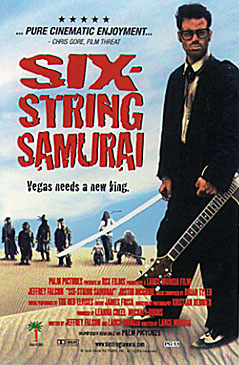Warning: Contains spoilers, and in all likelihood also fins and go-faster stripes.

"Nice tuxedo to die in!"
Theory 1B, aka Six-String Samurai:
Just what the hell is it about?
This is a perfectly reasonable question to ask on a first viewing of the
film, Six-String Samurai.
Many elements of the film simply seem to make no sense, the narrative at times seems
disjointed, and the setting a surreal sketch rather than a fully fleshed-out world. On
repeat viewing however, I have come to believe that there is more to Six-String Samurai
than is immediately apparent. It is easy to draw comparisons with Mad Max, the Wizard of
Oz and other films which have obviously inspired Lance Mungia's vision, but beyond the
world of cinema, Six-String Samurai can be viewed as a reworking of the great myth of the
Western World; the Quest for the Holy Grail.
The way it works - as I see it - is this:
Elvis is the Fisher King, the ruler of the Wasteland. If there is no king,
the land suffers, thus if no-one replaces Elvis, Vegas will fall. The quest must be
undertaken, and in the world of Six-String Samurai, a new caste of warriors have arisen to
answer this challenge: the Musicians. The rock'n'rollers, the Mariachis, the slide-guitar
geniuses, country and western crooners et al, who now carry a sword alongside their
six-string.
Now, we must assume that Vegas had its own musicians, after all, Elvis ruled there for
forty rocking years, so it is clear that it is important that the new king not only
be a rocker, but also a warrior, and that he must undertake the quest, not just be in
vegas already. Likewise there were already knights in the castle of the Grail, but none of
them could complete the Quest.
Death is the anti-King. He seeks the fall of Vegas (which is both the castle of the Grail, and the Grail itself), but can not directly attack it. Moreover, he can not simply follow the quest himself, but must destroy all others who would do so. So, Death has no power in Vegas, unless Vegas should have no king, in which case Vegas itself will die, and become the domain of Death.
The fact that Death is a Heavy Metaller probably just means that Lance Mungia and Jeffrey Falcon don't like metal, although it may relate to subliminal suicide messages and a general opposition of heavy metal nihilism and rock'n'roll's more optimistic sound. I dunno. The fact that he has his own rock'n'roll band (the Red Elvises) confuses the issue rather, although he does kill them too.
The general progression of the quest is rather like that found in many old sagas, including Arthurian myths. The hero and his sidekick (in Arthurian myth, usually a dwarf or squire, here the Kid) travel in a land devoid of any truly specific geography, encountering various obstacles and overcoming them (rarely by anything but courage of spirit and force of arms). Little attention is given to the inbetween bits, which in a more modern story might be devoted to character development. In this style however, character development is unnecessary, after all, you know what a knight should be like.
Many of the forces ranged against Buddy in his quest are essentially uninterested in his goals: the windmill people and their God, and the Cleaver family seem to have no stake in the fate of Vegas, and while the Red Army general does not like rock and roll music, he does not appear to be directly associated with death. This also ties in with the mythic pattern, in which the trials of the knight do not always relate to the goal, but rather to the testing of his knightly virtues.
Buddy's tests are of spirit and body. The tests of his strength are conquered with relative ease, but those of the spirit are more demanding, and require the aid of the Kid. He is beset by despair, doubt and temptation, in each case forging on because of the Kid's encouragement, or because the Kid is in jeopardy..
Buddy and the Kid are both unsuited to be king. For the land to be whole
the king must be whole, and neither Buddy nor the kid is complete. Buddy is a mighty
warrior, but afflicted with ennui and apathy. He is questing for Vegas, but he has no
passion or true desire to attain the prize.
Moreover, he is almost too strong. He has no weaknesses, no vulnerabilities; he has in
short no soul.
The Kid, conversely, is extremely vulnerable; he can not defend himself at all. However, he has the drive which Buddy lacks. Through everything, he not only never abandons Buddy, he keeps Buddy moving forward. Physically, the Kid obtains both the car and the motorbike for Buddy, and makes the bike go when Buddy has given up. When doubt strikes him in the desert, after the death of the young musician, it is the Kid who persuades Buddy to keep going.
The two seem connected, as if the Kid is what Buddy lacks; his soul. Notably, the only times Buddy is hurt are when he is distracted by defending the Kid. Moreover, at the very end, the Kid appears to have absorbed the strength from the dying Buddy, giving him the courage to stand up to Top Hat and defy and overcome Death.
... or that's what I think anyway.
... and I don't have any theories about the bowlers either.